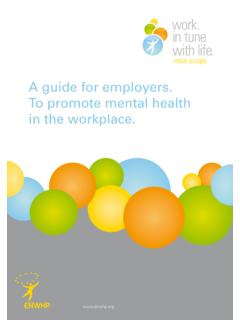Transcription of P O L I C Y 8 Mental Health at Work: Developing the ...
1 POLICY PAPER 8. P O L I C Y 8. Mental Health at work : Developing the business case The Sainsbury Centre Summary for Mental Health works to improve Every organisation in Britain is affected by Mental distress and ill Health the quality of life for in the workforce. At any one time one worker in six will be experiencing people with Mental depression, anxiety or problems relating to stress. Mental ill Health is normal Health problems by in every workplace in the land. influencing policy and practice in Mental The total cost to employers of Mental Health problems among their staff is Health and related estimated at nearly 26 billion each year. That is equivalent to 1,035 for services. every employee in the UK workforce. We now focus on The business costs of Mental ill Health are shown in Figure 1.
2 They comprise: criminal justice and billion a year in sickness absence. The average employee takes employment, with seven days off sick each year of which 40 per cent are for Mental Health supporting work on problems. This adds up to 70 million lost working days a year, including broader Mental Health one in seven directly caused by a person's work or working conditions. and public policy. billion a year in reduced productivity at work . Presenteeism' accounts The Sainsbury for times as much working time lost as absenteeism and costs more to Centre was founded employers because it is more common among higher-paid staff. in 1985 by the billon a year in replacing staff who leave their jobs because of Mental Gatsby Charitable ill Health . Foundation, one of Figure 1: The business costs of Mental ill Health at work the Sainsbury Family Charitable Trusts, billion from which we receive billon core funding.
3 J sickness absence j reduced productivity at work h staff turnover billion Simple steps to improve the management of Mental Health in the workplace, including prevention and early identification of problems, should enable employers to save 30 per cent or more of these costs at least 8 billion a year. Taking action to promote Mental wellbeing among staff, to give better help to those experiencing distress and to support those who need time off to come back to work makes business sense. The cost of neglecting Mental distress at work is simply too high to be ignored any longer. Introduction their implications for business, leading in turn Policy Paper 8 | Mental Health at work : Developing the business case to the development of better policies for the This paper discusses the importance to employers management of Mental Health in the workplace.
4 Of Mental Health problems in the workforce. The first part of the paper sets out the costs Drawing on UK and international evidence, it in brief. The latter sections show the detailed seeks to identify all the key effects of Mental ill calculations we made to arrive at these figures Health and stress at work and, wherever possible, and the references for the statistics cited. to quantify these in financial terms. We aim to demonstrate why Mental Health is important to all employers as a business matter. The evidence indicates that better management of The costs of Mental ill Health Mental Health at work makes good business at work sense, because of the substantial costs that are potentially avoidable through effective action. The extent of Mental ill Health in the There are a number of reasons for supposing that UK workforce Mental Health problems in the workforce are more important and more costly to employers than A broad definition of Mental Health problems is most realise.
5 For example: followed here, in line with the coverage of official surveys. This includes both severe and enduring Survey evidence indicates that the great conditions such as schizophrenia and bipolar majority of employers seriously under- disorder, found among less than 1 in 100 people estimate the prevalence of Mental Health of working age, and less severe but much more problems among their employees. Nearly half common conditions such as depression and think that none of their staff will ever have a anxiety. Mental Health problem: in fact the rate is at least one in six at any time. On this basis, the evidence shows that most The importance of Mental ill Health as a cause people with Mental Health problems are in of sickness absence from work is generally paid employment and are almost as likely to acknowledged but it is not always accurately be working as anybody else.
6 The prevalence of measured. Mental Health problems in the workforce is not Much less is known about the importance much different from that in the population at of Mental Health problems as a cause of large. As in the wider community, many of these impaired performance while people are at problems are undiagnosed and untreated. work . The evidence that is available suggests On average, employers should expect to find that that presenteeism', as it has now come to be at any one time nearly 1 in 6 of their workforce known, has a significantly larger impact on is affected by a Mental Health condition such as worker productivity than absenteeism. depression or anxiety. The proportion rises to over Mental Health problems in the workforce have 1 in 5 if alcohol and drug dependence are also other adverse consequences for organisations, included.
7 Such as increased staff turnover, which again are not always well recognised or recorded. These high rates of prevalence are not well Depression, anxiety and stress can contribute recognised by employers. In a recent survey of to the development of a range of physical senior managers, nearly half thought that none illnesses, including serious conditions such as of their workers would ever suffer from a Mental coronary heart disease. The work -related costs Health problem during their working life and over of Mental ill Health may be understated unless two-thirds put the rate at less than 1 in 20. allowance is made for these wider Health effects. Costs may also be understated if a fear Sickness absence of discrimination or even dismissal leads On average, employees take 7 days off work employees to disguise Mental Health problems a year for Health reasons.
8 It is estimated that and to blame absence or under-performance Mental Health problems account for 40 per cent of on ill-defined physical symptoms. this figure, or days a year. This paper aims to increase knowledge and In aggregate this amounts to 70 million working awareness among employers concerning the days lost each year. By way of comparison, about scale of Mental Health problems at work and . million days have been lost in each of the last Research on the scale and cost of presenteeism Policy Paper 8 | Mental Health at work : Developing the business case two years because of industrial action. is a relatively new subject and published work is largely US-based, although some studies have Of the 70 million days lost each year for Mental also been undertaken in Canada and Australia.
9 Health reasons, about 10 million are lost Drawing on the international evidence and because of anxiety, depression and stress which adapting it to the UK context, it is conservatively employees say is directly caused by their work or estimated that in the UK presenteeism working conditions. work -related Mental ill Health attributable to Mental Health problems accounts accounts for more days lost than any other cause for times as much working time lost as of work -related illness. absenteeism. According to surveys published by the CBI and The average cost of presenteeism is put at CIPD, the cost of sickness absence is estimated by around 145 per working day lost, corresponding companies at 75-80 a day on average. However, to the average gross daily compensation of a range of evidence suggests that this figure employees in the UK economy.
10 This is higher than is a significant under-estimate. Management the corresponding cost of absenteeism, mainly systems for recording, analysing and costing because the inverse association that is commonly sickness absence are not well developed in many found between earnings and rates of sickness organisations. absence (that lower-paid workers take more time Using an adjusted estimate of 120 for the off work than higher-paid workers) does not apply daily cost, the total cost of sickness absence in the case of presenteeism. attributable to Mental Health problems is put On this basis, it is estimated that the annual costs at 335 a year for every employee in the UK. of presenteeism attributable to Mental Health workforce. This is equivalent to an overall cost to problems amount to 605 for every employee in employers at the national level of billion a the UK workforce, or billion in total.








